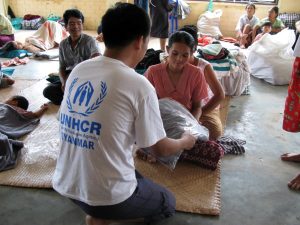The Myanmar military junta and its security forces are blocking humanitarian aid from tens of thousands in their vicious campaign to put down the broad-based resistance to February’s coup.
According to an extensive briefing released yesterday by the U.S.-based rights group Human Rights Watch (HRW), the military administration has “imposed new travel restrictions on humanitarian workers, blocked access roads and aid convoys, destroyed non-military supplies, attacked aid workers, and shut down telecommunications services.”
This is very much par for the course for the Myanmar armed forces, or Tatmadaw. The series of military administrations that ruled the country prior to 2011 exercised tight control over humanitarian aid and those, especially foreigners, that administered it. It nonetheless threatens to amplify the immense economic and social disruption that has resulted from its disastrous overthrow of the civilian government led by Aung San Suu Kyi and the National League for Democracy (NLD).
“Myanmar’s junta has worsened a self-created humanitarian catastrophe by displacing hundreds of thousands of people and then blocking the critical support they need to survive,” HRW Asia researcher Shayna Bauchner said in the statement. “The generals are callously denying lifesaving assistance to people affected by conflict since the military takeover, seemingly as a form of punishment.”
The February coup has prompted an economic, social, and humanitarian crisis with few parallels even in Myanmar’s recent troubled history. As resistance has burst forth across the country, the junta has carried out a nationwide counter-offensive, while expanding its operations against ethnic insurgents. HRW cites statistics claiming that the crisis has now displaced over 284,000 people, with an estimated 22,000 refugees fleeing to India and Thailand.
The United Nations Development Program (UNDP) predicted in April that as many as as 25 million people – nearly half of the country’s population – living below the national poverty line by early 2022, “a level of impoverishment not seen in the country since 2005.” The UNDP also expects urban poverty to triple by next year.
But the existing channels and processes for getting humanitarian assistance to those most in need, never easy or streamlined even under the civilian NLD administration especially in sensitive regions like Rakhine State, have been purposefully choked off by the junta authorities.
Andrew Kirkwood, the acting U.N. humanitarian coordinator in Myanmar, reported in September that aid efforts faced a number of “significant operational challenges” including travel and COVID-19 pandemic restrictions. The following month, UNICEF reported that “the need to procure travel authorization remains a major access impediment and a high constraint factor for the humanitarian partners’ capacity to reach people in need.”
Since the coup, according to HRW, soldiers have seized food deliveries en route to displacement sites and arrested people on suspicion of supporting aid efforts. Visas for aid workers have also been delayed or denied and the process of obtaining travel authorizations for humanitarian workers, already “highly bureaucratic and arbitrary” (a hangover from the old junta days), has grown even more difficult since the coup. As HRW notes, “this has severely impeded aid delivery, in particular during monsoon season floods.”
Like much else, this closely echoes the old junta days. Indeed, the current situation bears a remarkable resemblance to the junta’s reaction to the devastating Cyclone Nargis of April and May 2008, when the humanitarian assistance to the 3.4 million survivors was “deliberately blocked” by the junta. According to an independent report released in early 2009, the military “obstructed private cyclone relief efforts even among its own concerned citizens, setting up checkpoints and arresting some of those trying to provide help.”
The U.N.’s relief chief, Martin Griffiths, said last month that “access to many people in desperate need across the country remains extremely limited due to bureaucratic impediments put in place by the armed forces.” He called on the junta to “facilitate safe, rapid, and unimpeded humanitarian access.”
None of these calls are likely to make much impression on the coterie of generals in Naypyidaw, who have embarked on a path of total war against the centers of resistance to military rule, and the civilian population that has given the resistance both passive and active support. In this struggle, it is clear that the generals view humanitarian aid as a just one more political lever with which to break the resistance.

































